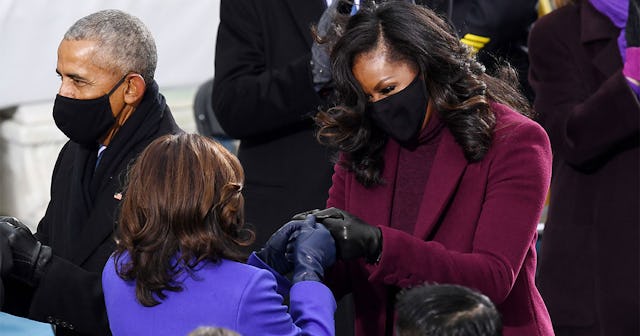No One Champions A Black Woman Like Another Black Woman

Watching Kamala Harris and Michelle Obama share a double fist bump at the inauguration was truly a historical moment. It was impactful to see that single gesture between the first Black and Southeast Asian female Vice President and the first Black woman to hold the position of First Lady.
But Black women across America understood the unspoken conversation that happened between these two women in that moment. It was a feeling of comradery, understanding, and “get it girl” wrapped up into a single gesture. And it was not only a historical moment, but a moment that defines the importance of sisterhood for Black women.
OLIVIER DOULIERY/AFP/Getty
Being a Black woman in America is an experience that you can not fully understand unless you live it yourself. We sit at this uniquely challenging intersection of race and gender, and it is a heavy burden to bear. It can be emotionally and mentally exhausting, and yet very hard to make other people understand. When Black women befriend each other, we know that if nothing else, we have this understanding in common.
This shared experience is the foundation for an unexplainable bond filled with understanding, acceptance and love. It’s an understanding of the quiet battles we fight and experiences we endure. It’s accepting each other as we are and not having to put the masks on that we wear in day-to-day life. And it’s unconditional love that allows us to be our unbridled selves without explanation.
Some media outlets will have you believing that Black female relationships are dysfunctional, problematic and filled with drama. But what you see on a lot of these “reality” shows is very far from the experience of most Black women. Our friendships are based on a bond of common experiences that blurs the lines between family and friends. It is something we saw our mothers, aunties and grandmothers model for us.
nappy/Pexels
Looking back on my childhood, I realize that sisterhood has always been important to me, almost an innate need. In elementary school, I was a part of a group of girls that everyone called the four musketeers. We were four little Black girls that were inseparable. We were always together at school, spent the night at each others’ houses on the weekends and bought matching outfits.
In high school, I joined a sorority called Marquettes for young Black girls and built deep friendships. We partied together, choreographed dance shows, cried over stupid boys and navigated the awkward teenage phase. To this day, I can call up any of these women and pick up right where we left off.
As a mom, I joined Mocha Moms to find the same sense of sisterhood with fellow Black moms. I was once again in search of friendships with women that have a shared experience. The unfortunate truth is Black women also have unique experiences in raising Black children that our non-Black counterparts may never fully understand. My sister friends know why I worry about certain schools not being the best option, what happens if my kids date outside of their race or how my kids will be perceived in unfamiliar spaces.
Black women are fully aware that we are maneuvering in a predominately white, male world. And historically speaking, we worked hard to carve our way into spaces that were not made for us or accepting of us. The mental and emotional labor that comes along with that is exhausting and sometimes we don’t want to have to explain it. We need friends that just get it and can hold space for that exhaustion without having to say anything.
Peter Griffith/Getty
Sisterhood with Black women is comforting and provides the feeling of a safety net. We don’t have to worry about code switching or wonder if an eyeroll or head tilt will be misinterpreted. There is no concern about being seen as too loud, too aggressive or too assertive. And we don’t have to overlook microaggressions, be talked down to, have our talents underestimated or have to coddle the very people that offended us.
We don’t have to worry about code switching or wonder if an eyeroll or head tilt will be misinterpreted. There isn’t a worry about being seen as too loud, too aggressive or too assertive. We don’t have to overlook microaggressions, be talked down, to or have our talents underestimated.
Friendship with other Black women offers a safe space. We can be things Black women aren’t expected to be… silly, soft, sensitive, vulnerable. We aren’t concerned we will get pigeonholed into being the “strong Black woman” or the “angry Black woman.” We know our sisteren see us as the multifaceted people we can be.
Black women need championing and no one champions a Black woman like another Black woman. No one is better at hyping us up or setting us straight than a sister friend. We have a way of communicating with just a sideways glance and “Girl” that can be translated into about 20 different sentences. A single mention of the word “Sis” can be used as a question, a reprimand or to hype you all the way up.
This doesn’t mean Black women don’t or can’t have white friends. Nothing could be further from the truth. And it’s really important that women surround themselves with a community of other women from all walks of life. However, sisterhood with Black female friends is a much needed sanctuary that Black women should never have to explain or apologize for.
This article was originally published on